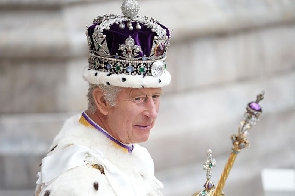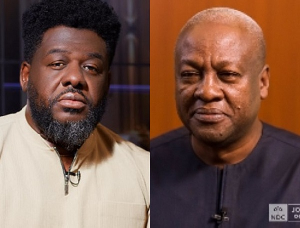A small moment during King Charles’ state visit to Kenya may have defined it.
An elderly war veteran was waiting in a wheelchair for his turn to meet the British monarch at the Commonwealth War Graves Commission’s Kariokor cemetery in Nairobi on Wednesday morning. It’s a peaceful oasis in a bustling neighborhood where makeshift market stalls line the streets.
Cpl. Samwel Nthigai Mburia fought for the British in multiple campaigns during World War II from 1939 to 1945, deploying to Ethiopia, Egypt, and Myanmar. He served under the command of Charles’ mother, Elizabeth II, who was still Queen of Kenya as well as the United Kingdom at the time. Mburia received several medals for his service, but in the 1950s he threw them away.
Why? Because anyone back then who had supported the British colonial power became a target for the Mau Mau resistance who were on their own campaign to seize their country back. Kenya ultimately gained its independence in December 1963, but the violent period in the lead-up saw thousands killed.
Ahead of Kenya’s 60th anniversary of independence, King Charles, accompanied by Queen Camilla, laid a wreath for Kenya’s fallen at the cemetery, then made his way over to meet veterans, including Mburia. Charles was briefed on Mburia’s service and was informed of his age. Military records revealed Mburia was born in 1906, according to the palace, which said he was 117 years old. His age would suggest he could be the oldest person in the world. (The world’s oldest verified living person is 116-year-old María Branyas Morera, according to Guinness World Records.)
Charles was handed a tray of shiny new medals which he presented to Mburia to replace the ones he had lost. “I hope they’re all the right ones there,” the King said, before remarking on the veteran’s age. “You must be on wild locusts and honey or something.” Mburia smiled as his honors glistened in the sunshine on his lap.
Royals are all about symbolism and this interaction spoke to everything the King and his aides were hoping to achieve on this trip. If the old medals represented a legacy of colonialism and violence, the new ones represent a redefined relationship between two independent states.
That afternoon, Charles gathered representatives of those who fought the British in Kenya during their struggle for statehood. It was a private meeting, and no media were allowed to observe. But Evelyn Kimathi was there.
Her father, Dedan Kimathi, led the resistance and was executed by the British. She revealed to us that she’d told Charles she wanted help finding her father’s body, which is missing, and that her family wanted their land back.
As a constitutional monarch, there’s little the King can do, and these demands are matters for his government. However, he can listen and make sure people like Evelyn are heard at the highest levels. That’s the power of monarchy. It can elevate issues and arguments even if it can’t be seen to influence them.
This discussion was one example of following through on a promise Charles had made at the state banquet as the visit kicked off. “In coming back to Kenya, it matters greatly to me that I should deepen my own understanding of these wrongs, and that I meet some of those whose lives and communities were so grievously affected,” he’d said.
The monarch has also visited the Uhuru Gardens, the site of Kenya’s declaration of independence, and toured a new museum showcasing Kenya’s history, including a “Tunnel of Martyrs,” where British-signed death warrants serve as a stark reminder of past injustices.
Charles’ approach to confronting challenging chapters in Britain’s history is a strategy we’ve seen from the new monarch in recent months.
This is the third state visit of Charles’ reign. The first two, to Germany and France, were thoughtful but in a different way. Relations with both countries became strained after the UK voted to leave the European Union in 2016. On those trips, he delicately referenced that turbulent period in speeches to politicians, earning him standing ovations in both parliaments.
King Charles’ moves are a progression from the way his mother operated. While Queen Elizabeth II always opted for impartiality and avoided the most sensitive political issues, Charles has shown no fear about wading into them while still finding a way to maintain a neutral position.
Many, like Evelyn, will say that “the struggle continues” and carry on demanding formal apologies and reparations. But the response from people he meets and local politicians to Charles’ actions on these trips would suggest that he is helping with some of the healing of these deep historical wounds.
He may not be a political figure, but he is a symbolic one. The “Listening King” may be giving the UK a more sensitive brand.
Africa News of Sunday, 5 November 2023
Source: edition.cnn.com













